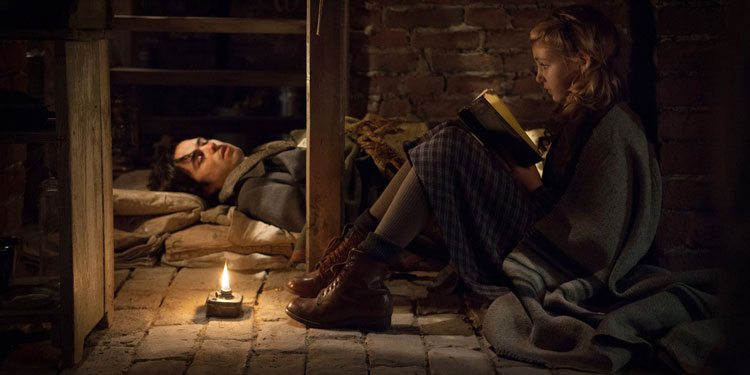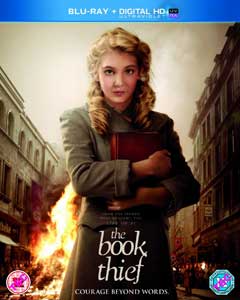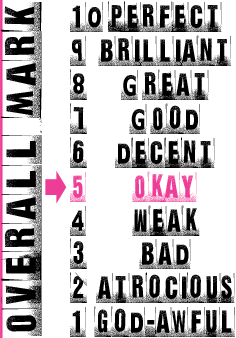
Director: Brian Percival
Running Time: 131 mins
Certificate: 15
Release Date: July 7th 2014 (UK)

Perhaps unsurprisingly, while an awful lot of films have been made about the Second World War, not that many have looked at the German side from a sympathetic perspective. However millions of ordinary people had to live under Nazi rule whether they agreed with Hitler’s policies or not, and while a lot purely submitted to the evil whims of the regime, others did what they could to oppose.
The Book Thief, based on Marcus Zusak’s novel, takes us back to this time and the life of young Liesel (Sophie Elisse), who is separated from her communist mother and sent to live with an ordinary couple, Hans (Geoffrey Rush) and the stern Rosa (Emily Watson). Initially she is illiterate and despite the difficult situation she has come from, relatively oblivious to the world around her.
As she learns to read, she begins to gain a love of words and their power, something that increases when Hans and Rosa agree to take in a young Jewish man, Max (Ben Schnetzer), who is the son of one of Hans army friends from the First World War. Liesel reads to the sick young man, and as she learns new things and sees things such as the book burnings and the increasing brutality of the Nazis, she begins to question whether just because she is German she should hope they win the war.
The book has rightly been acclaimed, but the problem with the film is almost that it assumes you’ve read the novel and so know what points the movie is trying to make. In the special features director Brian Percival talks about how having the book was like having a bible, but it feels like they were using it so much they assumed everyone would know what it’s all about thematically, and then forgot to put it in the movie. Therefore if you’re a fan of the novel it works just fine, but if you haven’t read it, it feels like it keeps getting close to a powerful message without ever quite getting there.
It doesn’t help either that it never quite finds the balance between its sentimentality and the cruelty happening around the main characters. The idea is presumably that we’re seeing things through the eyes of a child, but instead it often merely comes across as being rather twee and the film’s polished, glossy look takes it one step too far from reality. Even so, it’s possible to go along with it and add in what you know it wants to be saying, even if it doesn’t quite manage it itself.
For example, there’s a moment where Hans watches as the Nazis remove a local man they have decided is secretly Jewish. He must decide whether to step in– should he do the right thing and speak up, despite the risks – but it lacks tension purely because the film hasn’t really set up the stakes for this properly. There are numerous moments like this, where the movie presumes you already know exactly what’s going on and why it matters in that historical context. But if you already know and understand it all, it leaves you wondering why you need to see it here.
There’s also one scene towards the end which if you saw it in isolation, you’d presume was a ridiculous parody of Hollywood sentimentality. Indeed it’s almost audacious in its cheesiness, which is far from what you want at a moment that should be incredibly heart-rending.
The Book Thief isn’t a total failure, as the performances are good and there are moments that work well – indeed it’s never genuinely bad – but there’s a constant nagging feeling that this could and should have been much more than it is. Constantly you intellectually know the important ideas it ought to be illuminating – maintaining humanity and doing the right thing in the face of evil, the fact that behind the great events of history are ordinary people trying to survive – but it rarely makes you truly feel it. In fact you could come away thinking the film’s only real message is that you should hate Hitler, something that’s not exactly revelatory.
It doesn’t undoubtedly look very pretty on Blu-ray though, and the making of documentary is also pretty interesting, detailing such things as the (understandable) difficulty of using Swastikas during filming in Germany and the strict rules around how it must be done.
Overall Verdict: If you’ve read the book you’ll probably like the film, but that’s because you’ll be able to fill in the emotional and intellectual blanks for yourself. However others may wonder quite what the point of the film is.
Reviewer: Tim Isaac





Leave a Reply (if comment does not appear immediately, it may have been held for moderation)